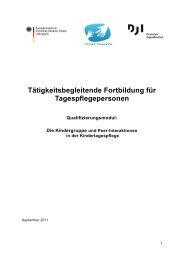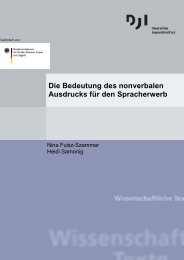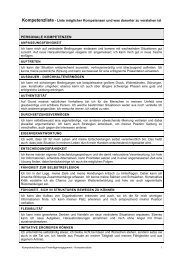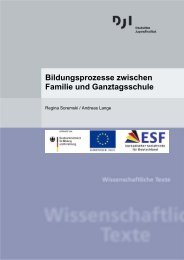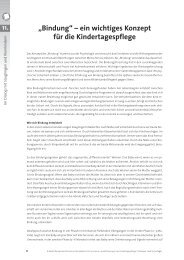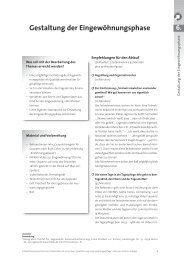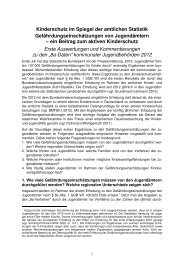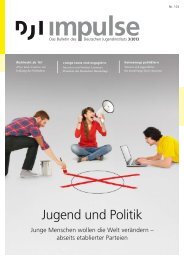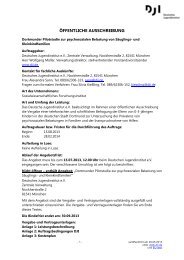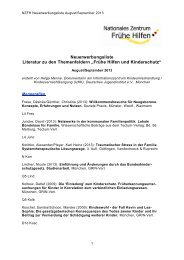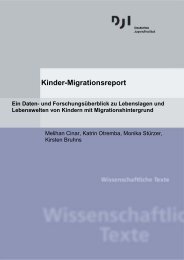download - Deutsches Jugendinstitut e.V.
download - Deutsches Jugendinstitut e.V.
download - Deutsches Jugendinstitut e.V.
You also want an ePaper? Increase the reach of your titles
YUMPU automatically turns print PDFs into web optimized ePapers that Google loves.
means of small subsidies to be able to mobilise local existing potential for the development<br />
of employment and integration within the employment market and thereby find local<br />
answers to local problems.” (…) “The aim is to provide particularly disadvantaged persons<br />
with the opportunity of integration or re-integration within the employment market,<br />
primarily through the utilisation of local resources. Local actors who have not previously<br />
taken on a prominent role within the framework of classical ESF intervention should be<br />
procured as project supporters.”<br />
Due to Germany’s federal system, the ESF programmes are implemented independently<br />
by the state and in the individual federal states. 12 out of 16 Länder (federal states) –<br />
Bavaria, Berlin, Brandenburg, Bremen, Hamburg, Hesse, Mecklenburg-Western Pomerania,<br />
Lower Saxony, Rhineland-Palatinate, Saxony, Saxony-Anhalt and Thuringia – have<br />
implemented programmes according to measure 11: some of these programmes have<br />
already been concluded whereas others are still in operation. The programmes are realised<br />
under a variety of project names and involve a variety of target groups, regional divisions<br />
and varying lengths of operating periods.<br />
Germany has also implemented measure 11 on a national level. In 2003 for example, the<br />
German Ministry for Family Affairs, Senior Citizens, Women and Youth (BMFSFJ)<br />
initiated the national programme “Local Capital for Social Purposes” (LOS) which will run<br />
up to 2008. The Ministry receives substantial support in the implementation of this<br />
programme through the coordinating office LOS as an “intermediary partner”. The LOS<br />
coordinating office is a working group [Arbeitsgemeinschaft] (ARGE) consisting of the<br />
foundation SPI and the Association for Social Business Consultancy.<br />
LOS has numerous similarities with other national and European programmes, but also<br />
several specific differences. A fundamental difference is that LOS pursues a socioenvironmental<br />
approach, i.e. concentrates on the encouragement of specific social<br />
environments. LOS provides support for urban districts with special development needs:<br />
up to the present, 287 different areas have been able to profit from support.<br />
As is the case in many European cities, certain urban districts in Germany are in a state<br />
of crisis. The lives of inhabitants are multiply characterised by the lack of participation in<br />
the world of employment and the subsequently resulting dependency on transferred<br />
income. This is accompanied by the loss of supporting social networks and a reduced<br />
access not only to social and cultural activities but also primarily to education. Social<br />
isolation and life in a closed milieu destroy links to ‘normal society’. Those who can afford<br />
it will move to more attractive areas, frequently leaving behind those who are already<br />
dependent on social benefits. Especially for children and young persons, this development<br />
implies poor chances of development and limited participation in society from the outset.<br />
The German federal government has created numerous programmes designed to break<br />
the vicious circle of these conditions. In addition to the LOS programme, this includes the<br />
federal-Länder programme “Urban districts with special development needs – the Socially<br />
Integrated City” which has provided support since 1999 for over 400 areas, and also the<br />
programme platform “Development and opportunities for young people in particularly<br />
disadvantaged neighbourhoods” (E&C), initiated in 2001 by the BMFSFJ which has<br />
primarily initiated activities within the framework of the encouragement of cooperation in<br />
69



